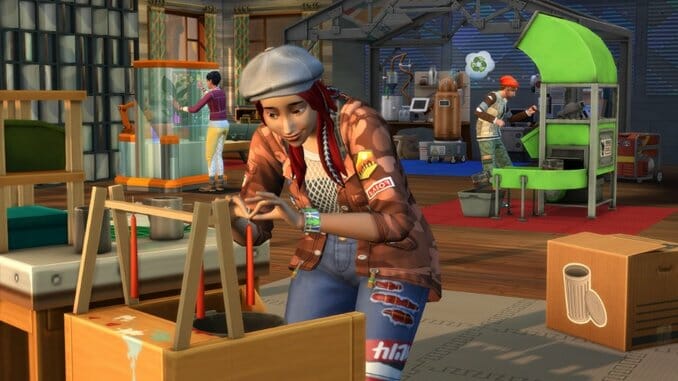The Sims has always been about living life—growing up, going to college, getting married, having a job. But with the last few expansions and content packs, the series has shifted its focus on the many different ways to live those lives, deviating from a predetermined suburban path to explore alternative approaches to domesticity.
The Sims 4: Eco Lifestyle is one of those expansions. With new items and city features focusing on the three R’s—Reduce, Reuse and Recycle—the Sims can now negotiate their resource footprint in exchange for benefits to their house and city. Be it community initiatives that incentivize sustainable living or machines that help reduce water and energy consumption, players must now consider how their personal habits affect the health of the community. It not only creates new strategic consideration within the game, but it also facilitates a level of interdependence and cooperation previously unseen in the series. No longer can the player only consider their single Sims family without it affecting the entire town.
To achieve this, Eco Lifestyle adds familiar green living gadgets like windmills, rain collectors, and generators, each of which can be upgraded to more efficient features with recycled materials crafted into repair parts. Their effect on the property can immediately be seen both in the interface’s progress bar (indicating a slant towards either green or industrial energy), and in the Sims’ utility bills, which will itemize how much each of the house’s resources cost and how they are subsidized by its upgrades.
The most interesting thing about the expansion is the ecosystem of interplaying features it creates with other content packs. Eco Lifestyle is most useful with the last content pack, Tiny Living Stuff, and the expansion Island Living. The former encourages small space habitation, while the latter offers off the grid options and the conservationist career path. Both supplement Eco Lifestyle well, offering fixtures that make the tricky balance of comfort and conscientiousness easier to manage. Together they make green living attainable but not difficult to the point of dragging down the game.
The new features also take a more active role in encouraging the player to alter the town. Whereas in the past I didn’t feel motivated to improve the buildings and businesses I didn’t have control over, in Eco Lifestyle, it’s a valuable part of the gameplay. Each neighborhood in the town has an icon that indicates its carbon footprint, and the player can go into those lots to make improvements that will adjust their output of pollution. There are also several different lot types to choose from depending on how you’d like to serve the city, from gardens to open-air marketplaces, and community voting initiatives that dictate how the spaces are used. Often these lots have to be completely overhauled, but redesigning each space for energy efficiency and benefit to the town is refreshing in its communal focus, making it one of the better building projects of the entire series. I spent several hours this week creating an enrichment center in Evergreen Harbor with separate rooms for music, studying, computers, crafting, fitness, job training, and gardening, watching with glee as the building filled up with a dozen Sims I’d never even met before. It adds a sense of meaning to an otherwise artificial game.
The content pack is not without issues. While the encouragement towards community engagement is admirable, most of the initiatives are superficial, and the focus on personal responsibility (and what it means for your utility bill) is a bit naive. That said, it’s nice to see the game finally get enough content to start creating rich and complex player stories, ones that experiment more with different types of land and resource use to reflect a broader scope of the human experience. The Sims 4 is coming together in a way that allows me to live a life that suits me.
Holly Green is the editor-at-large of Paste Games and a reporter and semiprofessional photographer. She is also the author of Fry Scores: An Unofficial Guide To Video Game Grub. You can find her work at Gamasutra, Polygon, Unwinnable, and other videogame news publications.
